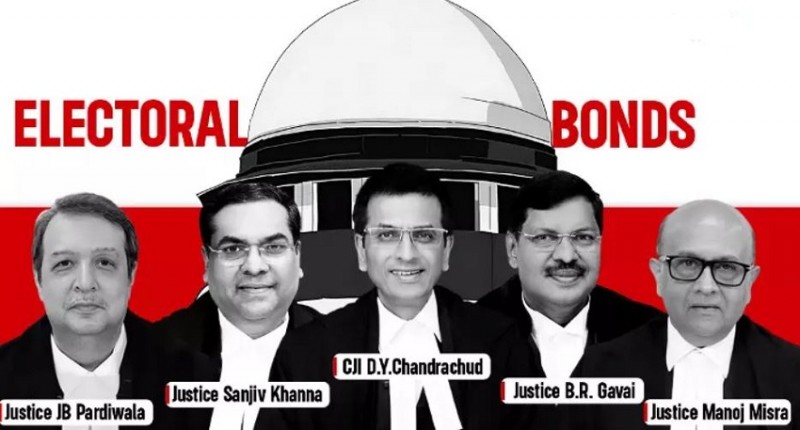
In a groundbreaking decision, the Supreme Court has put an end to electoral bonds, a significant source of funding for political parties in India.
Deemed "unconstitutional" by the apex court, the scheme has pumped over Rs 16,000 crore into the coffers of political parties since 2018. The ruling Bharatiya Janata Party (BJP) emerges as the primary beneficiary, pocketing around 55% of the total, which amounts to approximately Rs 6,565 crore. This data is based on information from the Election Commission and the Association for Democratic Reforms (ADR).
Electoral bonds, allowing anonymous donations, have played a crucial role in political funding, especially for some regional parties heavily reliant on them for financial backing. For the BJP, these bonds represent more than half of its overall income, underscoring their significance in sustaining political campaigns.
However, the recent Supreme Court ruling has cast uncertainty over the future of such funding mechanisms. Declaring the scheme unconstitutional, the court cited concerns regarding transparency and accountability in political funding. Chief Justice of India DY Chandrachud emphasized the importance of upholding fundamental rights and expressed doubts about the effectiveness of electoral bonds in curbing "black money" in politics.
Furthermore, the State Bank of India, the sole authorized seller of electoral bonds, has been directed to disclose donation details made through these bonds and provide recipient information.
Since the introduction of electoral bonds, the BJP's income has skyrocketed, making it the wealthiest party in India, surpassing its rival, the Indian National Congress, which witnessed a decline in fortunes except for intermittent periods.
In the fiscal year 2018-19, following the introduction of electoral bonds, the BJP's income more than doubled from Rs 1,027 crore to Rs 2,410 crore, while the Congress also experienced a significant increase from Rs 199 crore to Rs 918 crore.
In the fiscal year 2022-23, the BJP's total income stood at Rs 2,360 crore, with nearly Rs 1,300 crore attributed to electoral bonds. In contrast, the Congress's total income dropped to Rs 452 crore, with Rs 171 crore stemming from electoral bonds.
During the fiscal year 2021-22, funds received through electoral bonds by the BJP surged to Rs 1,033 crore, while the Congress's intake decreased from Rs 236 crore.
Other parties also received varying amounts through electoral bonds in the last fiscal year. TMC received Rs 325 crore, BRS received Rs 529 crore, DMK received Rs 185 crore, BJD received Rs 152 crore, and TDP received Rs 34 crore. However, the Samajwadi Party and Shiromani Akali Dal did not receive any contributions through electoral bonds during this period.
Nearly 50% of electoral bond funds come from corporates, with the remainder originating from "other sources."
An electoral bond serves as a financial tool for donating to political parties, functioning as a bearer instrument to ensure donor anonymity. There is no maximum limit on the number of bonds one can purchase or donate. Available in various denominations, including Rs 1,000, Rs 10,000, Rs 1 lakh, Rs 10 lakh, and Rs 1 crore, the Rs 1 crore denomination is the most popular.
Political parties must redeem these bonds within 15 days of receipt. Failure to do so results in the funds being transferred to the PM National Relief Fund.